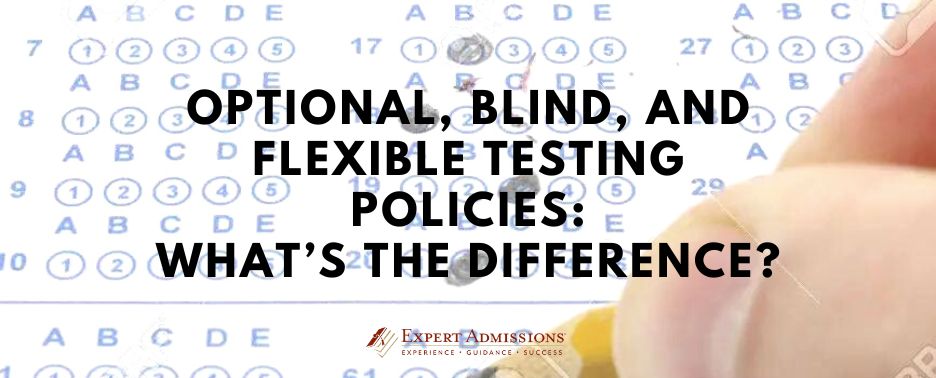
Test-optional policies became a hot topic of conversation during the pandemic and were widely adopted by colleges as students struggled to register and sit for SAT and ACT exams. But these policies are by no means a new idea; before the pandemic, more than 1000 colleges in the U.S. were test-optional. With so much attention being given to testing policies in the last couple of years, it’s important that you understand your options and how they can affect you as you prepare to apply for college.
Whether test-optional, test-blind, or test-flexible, each of these policies indicates that a college does not have a traditional SAT or ACT requirement on their applications. Schools adopting these policies deemphasize the use of standardized test scores in making admissions decisions, instead putting more weight on academic performance, extracurricular activities, and application essays.
Test-Optional Policies
Test-optional policies give students the choice of whether to submit their standardized test scores or not. This allows students to be strategic about submitting scores. For test-optional schools, we recommend that you do submit strong scores if you have them. Note that “strong” will mean something different at each school; you ideally want to submit scores that are at the top of a college’s middle 50% range (or higher). But if you have an otherwise competitive application and your SAT or ACT scores aren’t quite in range, you may be better off leaving them out of the application.
The list of test-optional colleges grew by leaps and bounds since the start of the pandemic, with some colleges adopting temporary test-optional policies and others making the change permanent.
Some test-optional schools may ask applicants to submit additional materials in lieu of test scores, like additional letters of recommendation or a graded assignment from a high school class.
Test-Blind Policies
Schools that are test-blind will not consider standardized test scores in your application, even if you choose to submit them. Test-blind colleges and universities tend to feel that SAT and ACT scores just don’t capture what’s most important to them about their applicants.
While it’s still a small number of schools that are test-blind, there has been an increase since the pandemic began. Notably, CalTech, Dickinson, Pitzer, and Reed have all adopted temporary test-blind policies through at least the fall of 2023. And following legal proceedings, the University of California System adopted test-blind admissions through 2025. Loyola University in New Orleans and Worcester Polytechnic Institute have joined the list of permanently test-blind colleges and universities, which also includes Hampshire College and Northern Illinois University. Counting both temporary and permanent policies, there are currently over 80 colleges and universities that are test-blind for fall 2023.
Test-Flexible Policies
Test-flexible admissions policies require applicants to submit test scores, but they do not require the SAT or ACT. Instead, students can submit results from AP, IB, or other exams (SAT Subject Tests were also a possible substitute until they were phased out by the College Board). Though there are very few test-flexible schools, it’s an important option to consider for students who perform better on some tests than others.
Schools that offer test-flexible admissions include Hamilton, Middlebury, NYU, and University of Rochester. Some schools have also adopted temporary test-flexible policies, including University of Michigan. If you’re a current high school senior, double check the policy for the schools on your list. And if you’re considering test-flexible schools, be sure to note which tests each school accepts, as they may have slightly different requirements.
With so many schools adopting a more flexible stance toward standardized testing, you can ensure that your applications are the best representation of your abilities. Remember that if you’re unsure of whether or where to submit your test scores, you can always check in with your school counselor for advice.
Leave a Reply